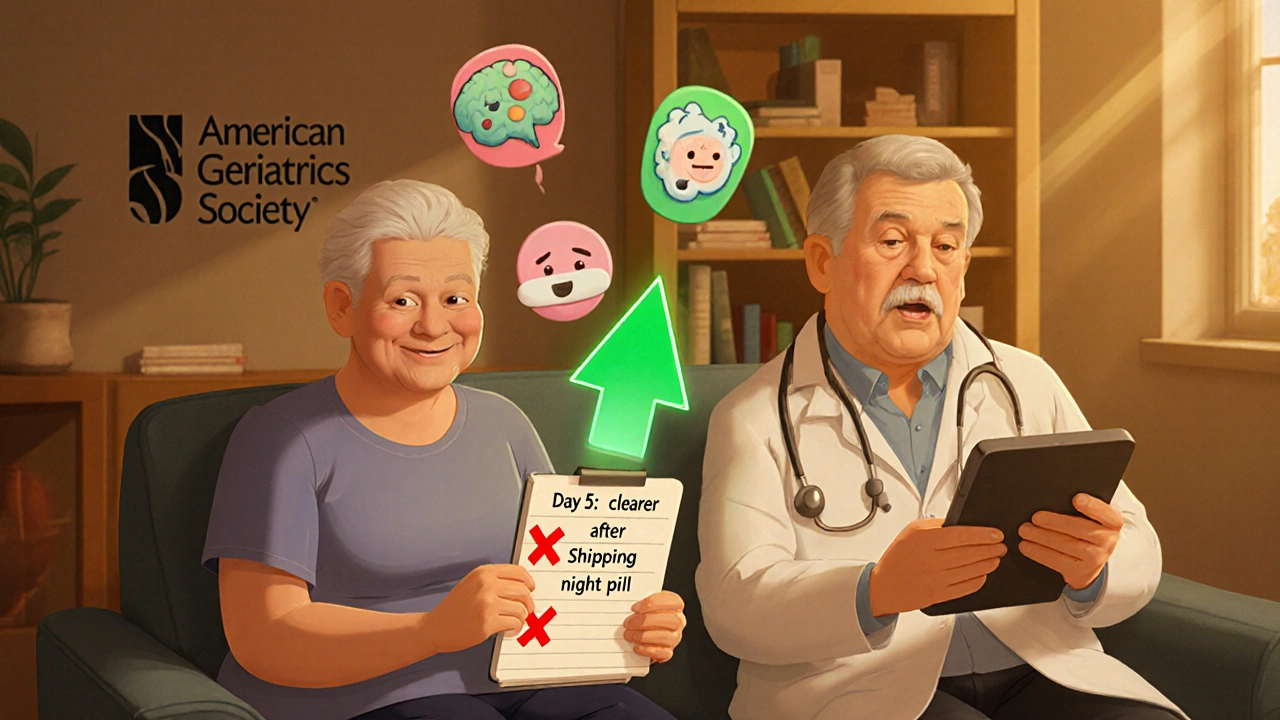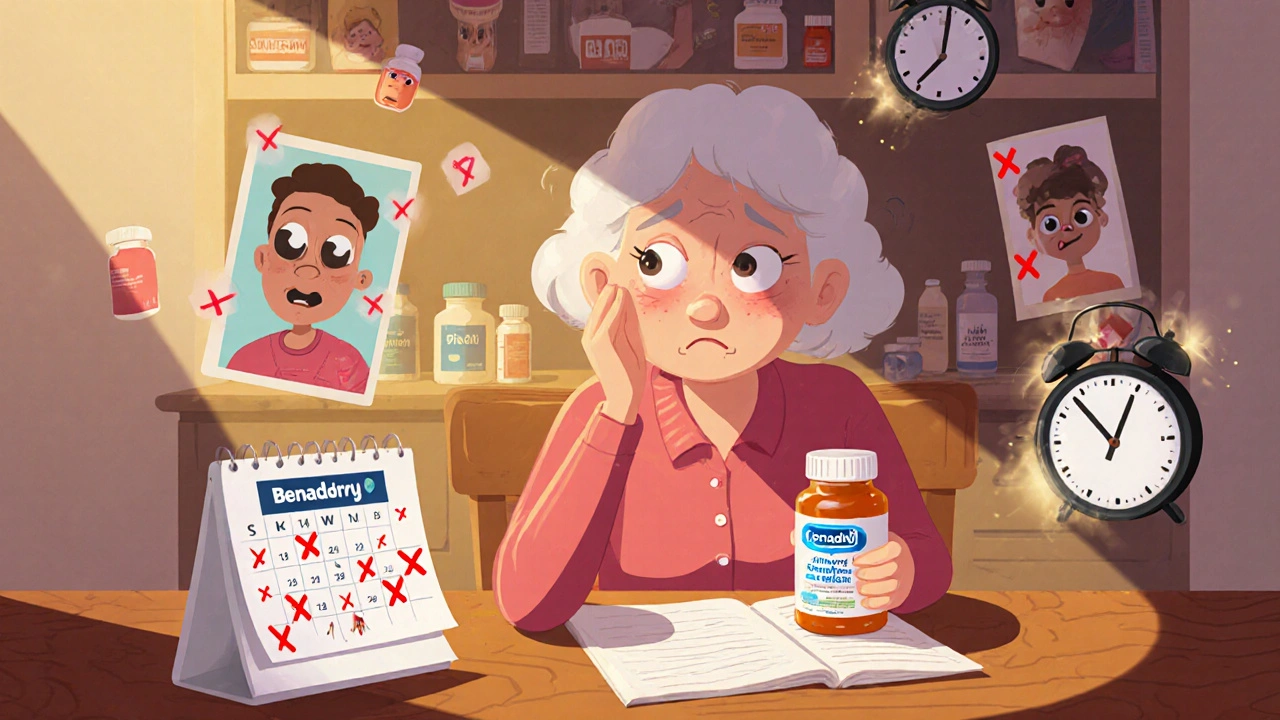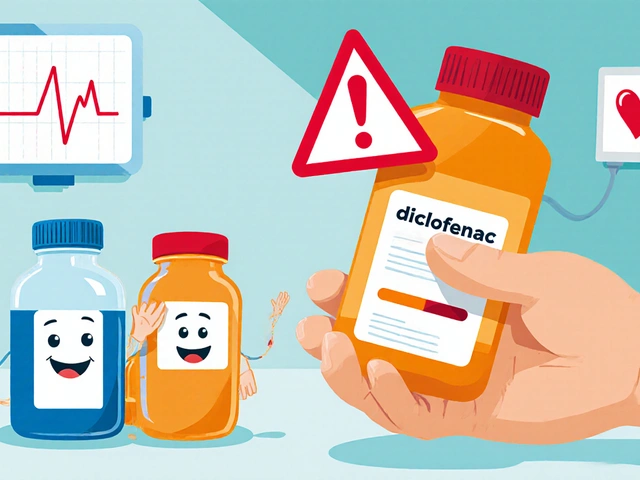Many older adults start noticing memory lapses, confusion, or slower movement and assume it’s just part of getting older. But what if these changes aren’t from aging at all - but from a pill they’re taking every day?
It’s more common than you think. In fact, up to 70% of seniors take at least one medication that can cause symptoms that look exactly like dementia or normal aging: forgetfulness, dizziness, sluggish thinking, or even trouble walking. The problem? Doctors often blame it on age, not the drugs. And that means people get misdiagnosed, prescribed more meds, and lose years of their life thinking they’re slipping into dementia - when the real fix might be as simple as stopping or switching one or two pills.
What Medications Cause Aging-Like Symptoms?
The biggest culprits are drugs that block acetylcholine, a brain chemical critical for memory, focus, and muscle control. These are called anticholinergic medications. They’re found in common over-the-counter and prescription drugs:
- Benadryl (diphenhydramine) - used for allergies, colds, or sleep
- Unisom and other sleep aids with diphenhydramine or doxylamine
- Detrol or Enablex - for overactive bladder
- Elavil or Norpramin - older antidepressants
- Seroquel or Geodon - antipsychotics sometimes used for sleep or agitation
- Promethazine - for nausea or motion sickness
These drugs don’t just cause mild side effects. They can trigger sudden confusion, hallucinations, or memory loss that looks just like Alzheimer’s. A 2015 study in JAMA found that people who took strong anticholinergic drugs daily for three years had a 49% higher risk of being diagnosed with dementia. But here’s the twist: when those same people stopped the drugs, their thinking improved - sometimes dramatically.
Other dangerous categories include:
- Benzodiazepines like Xanax or Ativan - cause short-term memory loss in 65% of seniors
- Corticosteroids like prednisone - can cause mood swings, paranoia, or confusion
- Opioids - even short-term use leads to memory fog in over half of older adults
And here’s the scary part: many of these drugs are prescribed for conditions that aren’t even the main problem. A senior gets a sleep aid for occasional insomnia, then takes it every night. Or a bladder medication is given for mild leakage, but the side effects make them forget where they are or who they’re talking to.
How to Tell It’s the Medication - Not Aging
True aging doesn’t happen overnight. Dementia from Alzheimer’s or other neurodegenerative diseases creeps in slowly - over months or years. Medication side effects? They show up fast.
Ask yourself these questions:
- When did the symptoms start? Did confusion or memory loss begin within two weeks of starting a new drug or changing a dose? That’s a red flag.
- Do symptoms get worse at certain times of day? If your loved one is foggy right after taking their nighttime pill but clearer in the morning, the drug timing is likely the cause.
- Are there physical signs too? Dry mouth, constipation, blurry vision, trouble urinating, or dizziness? These are classic anticholinergic side effects. If you see them alongside mental fog, it’s almost certainly medication-related.
- Is the decline sudden or steady? Dementia gets worse slowly. Medication effects can bounce around - one day okay, the next lost in thought. That’s not normal aging.
One case from Indiana University involved a 68-year-old woman who couldn’t remember her grandchildren’s names, forgot how to cook, and was labeled as having severe dementia. Her family was preparing for long-term care. Then, her pharmacist reviewed her meds and found she was taking Benadryl for sleep, an anticholinergic bladder pill, and a tricyclic antidepressant - all on the same list of drugs known to cause brain fog. After stopping all three over six weeks, her memory returned. She started recognizing her grandkids again. She didn’t have dementia. She had drug-induced cognitive impairment.

The Beers Criteria: Your Secret Weapon
There’s a tool doctors are supposed to use - but rarely do - called the Beers Criteria. It’s a list of medications that are generally unsafe for people over 65 because of their side effects. The latest version, updated in 2019, includes 30 drugs that should be avoided in seniors.
It’s not just about banning drugs. It’s about replacing them with safer options. For example:
- Instead of Benadryl for sleep, try melatonin or cognitive behavioral therapy for insomnia
- Instead of oxybutynin for bladder control, consider pelvic floor exercises or a different class of bladder medication
- Instead of benzodiazepines for anxiety, use SSRIs or non-drug approaches like mindfulness
Many primary care doctors don’t know the Beers Criteria well. That’s why you need to be your own advocate. Print out the current list (available from the American Geriatrics Society website) and bring it to your next appointment. Ask: “Is any of my medication on the Beers list? Is there a safer alternative?”
The ACB Scale: Measuring Your Risk
Not all anticholinergic drugs are equal. Some are mild, others are strong. The Anticholinergic Cognitive Burden (ACB) scale rates drugs from 1 to 3:
- Score 1 - Possible anticholinergic effect (e.g., some antihistamines)
- Score 2 - Likely anticholinergic effect (e.g., diphenhydramine, oxybutynin)
- Score 3 - Strong anticholinergic effect (e.g., tricyclic antidepressants, some antipsychotics)
If your total ACB score is 3 or higher, your risk of cognitive decline jumps by nearly 50% over three years. Many seniors are on multiple drugs that each add a point. Three pills with a score of 1? That’s 3. One pill with a score of 3? Also 3. Same risk.
Ask your pharmacist to calculate your ACB score. Most community pharmacies now have tools to do this automatically when you fill your prescriptions.

What to Do Next
Don’t stop any medication on your own. But do take these steps:
- Make a complete list of every pill, vitamin, supplement, and OTC drug you take - including what you take it for and when.
- Bring it to your doctor or pharmacist and say: “I’m worried some of these might be making me feel foggy or forgetful. Can we review them?”
- Ask about deprescribing - that’s the process of safely stopping unnecessary meds. It’s not about cutting pills cold turkey. It’s about tapering one at a time over weeks, watching for changes.
- Track symptoms in a notebook: When did you feel clearer? When did you feel worse? Did it line up with taking a certain pill?
- Request a medication review during your Annual Wellness Visit - it’s now required by Medicare for all beneficiaries.
Studies show that 35-45% of seniors labeled with dementia improve significantly after a careful medication review. That’s not a small number. That’s thousands of people getting their memory, independence, and quality of life back.
Why This Isn’t Being Fixed
Even though we know this happens, it’s still underdiagnosed. Why?
- Doctors are rushed. A 15-minute visit isn’t enough to dig into 10 different meds.
- There’s no blood test yet to prove it - though one is in trials.
- Pharmacies don’t always flag high-risk combinations.
- Patients don’t connect the dots between a new pill and new symptoms.
But change is coming. The FDA now requires stronger warnings on 17 high-risk drug classes. Medicare is pushing for routine medication reviews. AI tools are being tested to scan electronic records and flag risky combinations before they’re prescribed.
The bottom line? You don’t have to accept brain fog as part of aging. If you or a loved one has noticed sudden changes in thinking, memory, or balance - especially after starting a new medication - it’s not just “getting older.” It might be a side effect. And side effects can be reversed.
Don’t wait for a diagnosis of dementia. Ask for a medication review today. You might be surprised how much clearer things become - not because your brain got better, but because you stopped taking the drugs that were clouding it.
Can medication side effects really look like dementia?
Yes. Medications like Benadryl, bladder pills, and older antidepressants can cause sudden confusion, memory loss, and disorientation that closely mimic dementia. These are called anticholinergic side effects. Unlike Alzheimer’s, which progresses slowly, these symptoms often appear within days or weeks of starting a new drug - and can reverse when the medication is stopped.
What’s the most common medication that causes brain fog in seniors?
Diphenhydramine - the active ingredient in Benadryl, Unisom, and many sleep aids - is the most common. It’s available over the counter, so many seniors take it daily without realizing the risk. Studies show it’s linked to a 49% higher dementia risk over three years, even though it’s often used just for allergies or sleep.
How do I know if my loved one’s memory problems are from meds or aging?
Look for sudden onset - did the problem start after a new prescription or dose change? Also check for physical signs like dry mouth, constipation, blurry vision, or dizziness. True aging or dementia gets worse slowly. Medication side effects often come and go, especially tied to when pills are taken. If symptoms improve after stopping a drug, it was likely the cause.
Can I stop these medications myself?
No. Never stop a prescription medication without talking to your doctor or pharmacist. Some drugs, like antidepressants or anti-anxiety pills, can cause dangerous withdrawal symptoms if stopped suddenly. But you can ask for a medication review and start a plan to taper off safely over weeks or months.
Is there a test to check for medication-induced cognitive decline?
Not yet widely available, but researchers are testing a blood test that measures acetylcholine levels - the brain chemical blocked by these drugs. Early results show 89% accuracy in identifying medication-related brain fog. Right now, the best tools are the Beers Criteria list and the Anticholinergic Cognitive Burden (ACB) scale, which your pharmacist can calculate using your medication list.
What should I ask my doctor about my meds?
Ask: “Is any of my medication on the Beers Criteria list?” “What’s my total ACB score?” “Could any of these be causing my memory issues?” “Is there a safer alternative?” And “Can we try stopping one at a time to see if I feel better?”






Matthew Peters
My grandma was on Benadryl for years thinking it was just helping her sleep. One day she forgot my name. We pulled her off it and three weeks later she was telling stories from when she was 20 like it was yesterday. I swear it was like she came back from the dead. No one told us the pill could do this. Why do doctors just shrug and say 'it's aging'? That's not right.
Liam Strachan
This is such an important topic. I work in elder care and see this all the time. A lot of folks are on five or six meds that were prescribed by different doctors over the years. Nobody ever does a full review. The Beers Criteria should be mandatory. It's not complicated - just common sense. And pharmacists? They're the real heroes here. Ask yours to run your meds through the ACB scale. It takes five minutes.
Gerald Cheruiyot
Medication isn't the enemy. The system is. We treat aging like a disease to be managed with pills instead of a natural process to be understood. We give seniors drugs for symptoms we don't understand then blame them for the side effects. It's a loop. The real fix isn't stopping pills - it's changing how we see older people. They're not broken. We're just throwing chemicals at them hoping something sticks.
Michael Fessler
Anticholinergic burden is grossly underappreciated in clinical practice. The ACB scale is gold standard for cognitive risk stratification in geriatric polypharmacy. Most PCPs don't even know what it is. PharmD teams are the only ones routinely flagging this. If you're over 65 and on more than two meds with ACB score ≥2, you're in the danger zone. Deprescribing protocols are evidence-based and safe when done gradually. Ask for a med rec at your next wellness visit - it's covered by Medicare. Don't wait for a crisis.
daniel lopez
Big Pharma is literally poisoning our grandparents to keep selling more drugs. They know Benadryl causes dementia. They’ve had the data for 20 years. Why do you think they keep it on the shelf? Because they make billions off dementia care. They don’t want you to know you can just stop the pill. They want you in a nursing home. And your doctor? They’re on their payroll. Read the FDA whistleblower reports. This isn’t medicine. It’s corporate murder.
Nosipho Mbambo
Okay, but... like... why is this even a thing? Why do people just take random pills? I mean, I get that people are old and confused, but... someone should’ve checked. Like, why didn’t anyone just... stop the medicine? It’s not that hard. Why is this a whole article? I thought we were past this.
Katie Magnus
Wow. So now we’re blaming doctors for prescribing? What’s next? Blaming the sun for being bright? People take meds because they’re sick. If your brain gets foggy, maybe you’re just aging. Maybe you’re not special. Maybe you’re just a normal human with a normal brain that’s wearing out. This post feels like someone trying to make a viral video out of basic biology.
King Over
My dad took Unisom for sleep for 10 years. One day he stopped cold turkey. No tapering. No doctor. Three days later he remembered how to play piano. He hadn't touched it since 1998. He played Chopin for two hours straight. That's all it took. No therapy. No supplements. Just stop the damn pill.